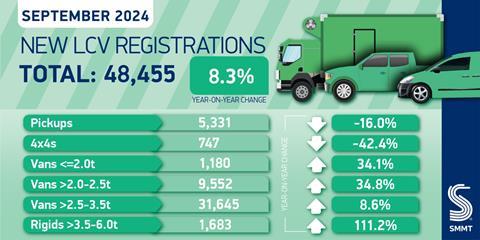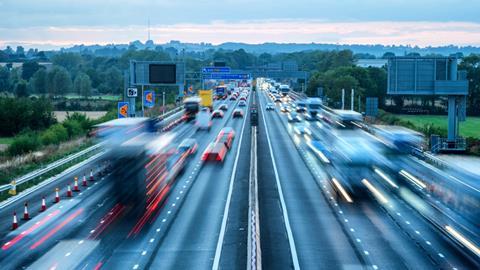Whilst Britain’s new light commercial vehicle (LCV) market grew for the second month running in September, up 8.3% to record the best performance for the month in four years, new BEV registrations fell for the fourth successive month.
According to the latest figures published by the Society of Motor Manufacturers and Traders (SMMT), some 48,455 new vans, 4x4s and pickups were registered as more businesses invested in fleet renewal than any month this year bar March, encouraged by the introduction of the new ‘74’ numberplate.
This has seen 267,339 new LCVs joining UK roads this year, up 3.6% on 2023 and the largest January-September volume since 2019.
Growing demand for the smallest vans continued, rising by 34.1% to 1,180 registrations, while deliveries of new medium sized vans increased by 34.8% to 9,552 units.
The largest models remained the most popular, up 8.6% to 31,645 units, accounting for more than a sixth (65.3%) of the market. There were fewer pickups and 4x4s joining the road, however, down -16.0% and -42.4% respectively to 5,331 units and 747 units, following particularly strong demand last year.
Despite the overall robust market growth, new battery electric van (BEV) registrations fell slightly, by -0.5% to 3,020 units, making September the fourth successive month of falling BEV demand and the sixth month of decline across 2024.
Registrations of BEVs up to 3.5 tonnes fell by 19% in September 2024 to 2,342. However, on the upside registrations of new rigid Bevs between 3.5 tonnes and 4.25 tonnes rocketed by 346% in the month, to 678, up from 152 in September 2023.
SMMT said 14,188 new BEVs have been registered since the start of January, -7.7% below the same period last year.
It also noted that, despite significant manufacturer investment to offer more than 30 different BEV models that are widely suited to the needs of UK businesses, the very greenest vans represent just 5.3% of all new LCVs registered so far in 2024 – just over half the 10% required by the UK’s zero emission vehicle mandate.

SMMT warned this week that decarbonisation will only be possible if fleet operators are confident that the switch is commercially viable. It added that global economic challenges in recent years have seen BEVs remain ”stubbornly” more expensive to source, produce and, despite compelling offers, more expensive to buy.
SMMT also pointed to the lack of chargepoint infrastructure, particularly those that are suited to the specific needs of vans, as a major barrier for fleet operators considering the switch.
Last week SMMT and 12 major vehicle manufacturers wrote to the Chancellor calling for measures to and help speed up the pace of the consumer and business EV transition, including:
- Maintaining and extending, beyond 2025, the important Plug-in Van Grant;
- Equalising VAT on public charging to match the 5% home charging rate;
- Mandating infrastructure targets to support those who cannot charge at home and with provisions for the additional size and power requirements of zero emission vans.
Mike Hawes, SMMT chief executive, said: “Growing overall demand for new vans is encouraging as the sector, a barometer of the UK economy’s health, continues to recover post Covid.
“But while manufacturers have invested huge sums delivering zero emission technology and incentivising its sale, consistently low demand is constraining industry from meeting Britain’s ambitious zero emission vehicles sales mandates.
“For van fleets to go green at pace they need the immediate encouragement – and long-term certainty – of fiscal incentives and van-specific charging infrastructure. Without these, UK decarbonisation ambitions cannot be achieved at the world-leading speed demanded by regulation.”

















